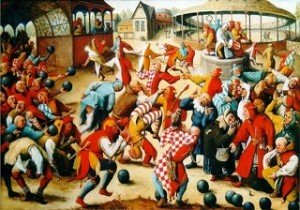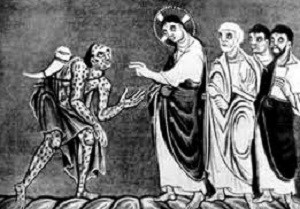
Arquivo para a ‘Linguagens’ Categoria
The bas-fonds and the Carnival
Walking through the central streets of my hometown, Bauru of São Paulo (Brazil), I pass by a girl already with a bean and a lady’s body, with a sandal with moorings and silver pieces of leather, wearing shorts that barely closes at the thick waist, a dark T-shirt with the Eiffel tower and the word Paris printed in his t-shirt in Golden color, I remembered the book by Dominique Kalifa: Bas-Fonds: History of an Imaginary (edUsp, 2017).
by a girl already with a bean and a lady’s body, with a sandal with moorings and silver pieces of leather, wearing shorts that barely closes at the thick waist, a dark T-shirt with the Eiffel tower and the word Paris printed in his t-shirt in Golden color, I remembered the book by Dominique Kalifa: Bas-Fonds: History of an Imaginary (edUsp, 2017).
The book I mistakenly bought at the end of the year thought to be the origin of the Happy Holidays, the traditional end-of-year greetings, but when I opened the book I understood the “cities in crisis”, the dirty, the greasy and the deformed one, the Kingdom of the Destitute, Sodom, Rome and Babylon, finally some of the chapters of the book of Dominique Kalifa.
In fact the center of the cities became peripheral, at least in the medium cities, and the centers went to the malls in some condominium closed to the condominiums, where there are clubs, bars, shops and even chapels, privatizing the jogging.
The author says, “the bas-fonds … understand each other instantly” (Dominique, 2017, p.11), perhaps in French but in Portuguese english it took me a long time to connect the periphery (which nowadays frequent central commerce) and Carnival fantasies (at least the Brazilian, made by people from the periphery)..
I find in the beginning of the book the connection with the carnival: “the bas-fonds extend through a mobile, vague terrain in which reality, the worst of realities, is in collusion with the imaginary, a terrain in which the social ‘Is constantly redefined by the’ moral ‘, in which the flesh-and-blood beings mingle with characters of fiction “(ibid, p. 11).
He clarifies that from the “positive” figure of the Greek philosopher Diogenes “the poor of God, the” poor of Christ “,” the poor with Peter “of the Middle Ages, XIII “in France and England, the terms of vagond and vagrant” (page 69), which the author calls “the invention of the poor poor.”.
Dominique goes on to cite a number of authors: “The comparison of the threatening proletarians with the Indians of America is a recurrent motive, which explains in part the immense success [of the Fenimore Cooper novels]” (page 109) , also quotes: Balzac, Sainte-Beuve, Dumas, George Sand, Maxime du Camp, Eugène Sue, Bérange and others mentioned in previous pages, fall in love with “Walter Scott of the wilds” (of book of the Henri Couvain).
Just to tell you how universal it is, I also remember “Bola de Sebo” tale by Guy de Maupasanti, and the film Rale (Donzoko, 1957) whose translation into French exactly by The Bas-fonds, little known film of this great diretor.
The origin of the carnival however is more controversial, the Carnival of Venice or perhaps the party of the crazy, described in 1445 like “party of the crazy ones” made in the faculty of Theology of Paris (modern engraving picture above).
The transformation of the joy of the imaginary of the poor has become almost everywhere, a private party in which the parade of the imagination of the bas-fonds is watched.
Kalifa, Dominique.Os bas-fonds: história de um imaginario (The bas-fonds: History of an imaginary), trad. Márcia Aguiar, São Paulo: Edusp, 2017.
The exclusion and the lepers today
It is not uncommon even in places of relative calm and social well-being that  the man feels uncomfortable and displaced from everything that lives and feels around him: families are no longer just a place of comfort, in Brazil the rates of domestic violence frighten , even laser space like football fields and other sports are encountering fights, corruptions and various types of violence, not to mention the society at large that lives at alarming rates.
the man feels uncomfortable and displaced from everything that lives and feels around him: families are no longer just a place of comfort, in Brazil the rates of domestic violence frighten , even laser space like football fields and other sports are encountering fights, corruptions and various types of violence, not to mention the society at large that lives at alarming rates.
We think that isolation is the solution, when not alone in groups and often in large groups, we also form our bubbles of “security”, are no longer spaces of comfort because it is almost unattainable, but safety.
The widening of the concept of individualism to that of microspheres and spheres of Sloterdijk, the spice that we find coming out of the self and going to the self is not enough, in him we feel the absence of something essential, if we can not reach the spiritual sphere, which I call the noosphere (sphere of the spirit), we must understand the processes of exclusion of the “bubbles”.
First because they are unreal these days, we live a wide-ranging exhibition, Byung-Chul Han talks disc and in the recent book of Domenico de Mais (post Monday here) also speaks of social “disorientation”, and therefore is not of liquidity, but of fleeting spheres and a new relation with exclusion: the peripheries existences and their “bubbles”.
There will be no solution if there is no leap beyond itself, it is a beyond that which was badly defined in philosophy as one for itself, although there also occurs the danger of fideism and subjectivism, it is in him that we find it open spheres of our dreams, of our poetry and of a worldview without exclusion, the problem that Heidegger called Weltanschauung.
Oscillating between a religious pique and a pseudo-religious low-level materialism, the necessary world view becomes a vision without exclusion, that world in all persons may be part of it.
At a time when leprosy (the leprosy) was the worst kind of exclusion, and was even considered “One,” Jesus’ words can well summarize the exclusion of that time in Mark when a leper asks him on his knees: “If you want , you can cleanse me! “Jesus reached out and touched him and said,” I want to. Be purified! “(Mark 1: 40-41).
Leprosy today is many, look around us and how many people excluded in the various bubbles that look around and say haughty “are not our people” because these “are impure.”
Individualization and relationship losses
All processes of modern individualization were forms of isolation of the subject, initially of objects (the famous Kantian rupture between objectivism and subjectivism), after the individuals among themselves, but Sloterdijk we go further, states “anatomical.”
initially of objects (the famous Kantian rupture between objectivism and subjectivism), after the individuals among themselves, but Sloterdijk we go further, states “anatomical.”
The form of his criticism is one of the pillars of the pathetic nation-state, the formulation of Rousseau who was “the inventor of man without a friend, who could only think of the other complement in the form of an immediate maternal nature or an immediate national totality. “(Sloterdijk, 2016, 248).
The solitude of modern man gives a more solid explanation: “If the individual can not complete and stabilize himself through successful applications of the techniques of solitude – for example, in artistic exercises and written soliloquies – he is destined to be absorbed by the totalitarian collectives “(p. 349) for this, writes in Spheres I on the bubbles.
It gives an anatomical explanation for this: “The modern solitary subject is not the result of his own choice, but a fractional product of the rude separation of birth and placenta.” (350), just as he had already spoken of the heart in the relationship with the Other, now traverses the original aspect, the attachment of the child to the mother through the placenta, this helps to understand his concept of “anatomical individualism.”
He resorted to the novel of Orpheus and Eurydice to explain the rupture, in Greek mythology Orpheus was the son of the muse Calliope with the Apollo or Éagro, king of Thrace, knows Eurydice and falls in love and marries with her, but the beauty of Eurydice attracts a beekeeper Aristeu, but Orpheus pursues her and in pursuit she stumbles on a serpent that bit her heel and kills her.
Orpheus’s symbology that serves the modern man is the pursuit of the relationship, but without abandoning his “anatomical individualism” he can not reach communion, the umbilical connection that prevents him from “truthful relations”, organic, although he praises “pure relationship “As did Orpheus who praises her in his songs (photo).
Maybe Sloterdijk does not know, but the brazilian popular dictator: “looking at his own belly button” that has exactly an individualistic sense, in this case is looking at the relationship lost.
SLOTERDIJK, P. Esferas I: bolhas (Spheres I: bubbles). Translate to portuguese: José Oscar A. Marques São Paulo: Estação Liberdade, 2016
It is necessary to leave, body and soul
The idea that idleness comes from the Greeks, and there is even literature extolling it  for false wisdom, does not correspond to truth, see what Aristotle says on the subject: “to exalt inertia more than action does not correspond to truth, because happiness is activity, “on the other hand activism prevents reflection and rest for a profitable activity.
for false wisdom, does not correspond to truth, see what Aristotle says on the subject: “to exalt inertia more than action does not correspond to truth, because happiness is activity, “on the other hand activism prevents reflection and rest for a profitable activity.
Byung-Chul Han warns that our current culture is of a “Society of fatigue” (edited in Brazil by Vozes 2017): “The society of tiredness and performance today has traces of a coactive society, each carrying a field , a field of work. The specific characteristic of this field of work is that each one is both a prisoner and guardian, victim and tormentor, master and slave. We explore ourselves. “(Han, 2017, 115)
We give no respite to our body (of course others give too much), “work out” and other forms of exercise (Sloterdijk will call it “unsprayed ascesis”), fill with medicines and vitamins (the principle of immunology in both authors) , and it is not a quest, but only to be filled with nonsense until self-exhaustion.
Also the excess of courses (I’m referring to courses without content and profit), motivational lectures that cost 100 to 1 thousand reais, are part of a new wave.
It is a human search, understandable, everyone wants to find the new one, but if you look closely this set of things are just old ideas and attitudes made up, to “sell.”
Reeducating thought, relationships and even what we think of spirituality, which means giving meaning to subjective things (I have already said that there is no detachment or criticism of objectivities that would be a dualism), it means structuring the human soul and clear in a body.
It is necessary to get out of the routine, from the bureaucracy of daily life, without taking into account the mediatic appeals only.
In the Gospel of Mark, which recounts the healing of the mother-in-law, exalted in many preaching because she is server, but there is a more precious detail that says that Jesus left at night to pray and in him when the apostles say (Mk 1,37,38) Jesus replied: “Let us go to other places, to the surrounding villages! I must also preach there, for this is what I came for. ”
Self-indulgence and inertia need healing, it is necessary to move those who have a new spirit should quit the quest, should go out to listen to others, to live a healthy life
A New Spirit of seeing things
Separation between mind and spirit is a contemporary construction, as well as the relationship with objects, technology and other objectivities, such as money, for example, exert on Western thought, especially, certain mistrust.
relationship with objects, technology and other objectivities, such as money, for example, exert on Western thought, especially, certain mistrust.
The objective world that exists outside man must be understood in order to have a good relation with him, modernity says that man must “dominate” it, but nature and objects seem to rebel, not because machines control us, but because its use requires behavior changes and new relationships with society and context.
The existence of evil, which Augustine of Hippo said was the “absence of good,” and he was a Manichaean (the struggle of good and evil), and that for society in crisis is a set of symbolic facts, war, challenges among rival twists, xenophobia and other phobias, is closed in the fact that we live in an “evil” context that needs to be renewed.
One of the first things that must be renewed is thought, says Edgar Morin, but they also say good spiritualities and authors who work on human subjectivity.
A world without feeling is not because of the machines, but of the thought and social relations that surround us that are complicated in the current context.
In Mark 1: 27 we read: “And they were all amazed, and asked one another, What is this? A new teaching given with authority: He commands even the evil spirits, and they obey! ”
The fact that Jesus “healed” was for many at that time a new fact, with a certain amount of “exorcism” because of the fact that many diseases were not known, clarification about many things was obscure, but they did not fail to understand that there was ” a new teaching given with authority, “that is, a new spirit of seeing things
Oscar 2018 and news
I was ready to comment on the Oscar, but to my surprise the movie The Post – The Secret War, directed by Steven Spielberg appears among the indicas, with Meryl Streep (candidate for best actress) and participation of Tom Hanks, tells the real story about the Vietnam War and the backstage of The Washington Post in 1971, which hits the big screen on Thursday in many national (brazilian) cinemas.
directed by Steven Spielberg appears among the indicas, with Meryl Streep (candidate for best actress) and participation of Tom Hanks, tells the real story about the Vietnam War and the backstage of The Washington Post in 1971, which hits the big screen on Thursday in many national (brazilian) cinemas.
Two other Oscar-nominated premieres have been Artist of the Disaster and Visages, Villages that are also national film premieres and are worth watching.
Other good surprises have been the nominations for the films “Blade Runner 2049” for art direction, photography, special effects, sound editing and sound mixing, as well as director Jordan Peele for “Run!” movie.
It was also surprising actress Mary J. Blige is the first nomination in a year in two categories: best supporting actress and best original song in “Mudbound”
Deceptions 13 nominations for “The Shape of Water” the romantic fantasy directed by Mexican Guillermo del Toro, seems very exaggerated, and the omission of the movie The King of the show, which had several indications to the Golden Globe, won only “This is me “.
Surprisingly “Dunkirk” nominations by British Christopher Nolan (eight nominations), and the independent production “Three Announcements for a Crime” (with seven).
“The Destiny of a Nation,” a political film focused on the figure of Winston Churchill, obtained six nominations, even number from the drama “Ghost Plot”, just but exaggerated.
Evil and the Nature of Good
Augustine of Hippo was a wandering Manichean, with a bohemian life and full of loves, he had a son, his mother Monica a fervent Christian asked for the conversion of the son, but Augustine judged the ignorant Christians too elaborate until he met Ambrose , who was the bishop of Hippo, who was an intellectual and had been mayor of Liguria and Emilia, who had the Mediolan capital, today Milan, later the people made him a bishop.
of loves, he had a son, his mother Monica a fervent Christian asked for the conversion of the son, but Augustine judged the ignorant Christians too elaborate until he met Ambrose , who was the bishop of Hippo, who was an intellectual and had been mayor of Liguria and Emilia, who had the Mediolan capital, today Milan, later the people made him a bishop.
In the contact with Ambrose, Augustine becomes Christian and writes in this period The nature of the Good, where he contests the conception of Mani with respect to evil, and then the duality of principles that was based on the cosmological system of the manichean sect, is replaced by an ontology.
Augustine then worries about affirming that all nature is a good, since it proceeds from God and that evil, is not among created beings, but is constructed when not doing good.
Augustine knew Faust who was one of the great sages of the Manichean sect, but discovered that his knowledge was limited and restricted to Grammar, Cicero and something of Seneca.
In a more elaborate way, Augustine’s complete theory states that there is a corruption of the mode (modus), species (order), and order (ordo), which are ontological attributes of beings, and therefore there is no ontological evil, its philosophical-theological implications.
Augustine’s thinking on matter is not the dualism between spirit and matter, he says:
“He did not know that God is spirit and has no members endowed with length and breadth, nor is matter because matter is less in its part than in its whole. Even if matter were infinite, it would be smaller in some of its parts, limited by a certain space, than in its infinity! “(AGOSTINHO, 2006).
But what if evil happens how to react to it? Augustine clarifies this, in order to judge man with justice, conferring punishment or punishment upon him, the very social perception of evil, according to the actions or intentions of the practitioner, affirms: “[…] it is not unjust to give oneself to the perverse the power to harm one another, that the patience of the good may be proved, and the iniquity of the wicked be punished. ” 21 of his work “The nature of the good”.
Two contemporary works deal with these dilemmas: “The Fragility of Goodness,” by Martha Nussbaum and Paul Ricoeur’s “Symbolic of Evil,” evil is a philosophical question posed, not is therefore the Manichean question.
AUGUSTINE, Saint. Confessions. New York: Image Books, 1960 (Notes in Brazilian edition by Vozes Editor).
(Português) Mesmice e outridade
Mesmice e outridade
Para desenvolvermos a ideia de outridade recorremos ao que Edgar Morin (2010, p. 192) chama de memento ou de modo mais simplista “lembrete” que é a maneira de trabalhar conceitos sem defini-los, que significa dar fim e não admitir a dinâmica de conceitos:
“O método da complexidade pede para pensarmos nos conceitos sem nunca dá-los por concluídos, para quebrarmos as esferas fechadas, para restabelecermos as articulações entre o que foi separado, para tentarmos compreender a multidimensionalidade, para pensarmos na singularidade com a localidade, com a temporalidade, para nunca esquecermos as totalidades integradoras.”
Mas ao fazer uma busca na web descobri que o termo já existe, definido por Landowski mais ou menos assim: “calculadas, homólogas ao afastamento que seus públicos mantêm. Frente ao Outro é preciso resguardar-se, diz o enunciador mapeador, qualificando-o de exótico, ao exibi-lo para o display, mas, em outros casos, é preciso ocultá-lo do holofote, deixá-lo nas margens; assim, ele pode ser assimilado, admitido ou segregado; em certos casos, será necessário inscrevê-lo como inimigo, excluindo-o.»
Embora seja confundido com alteridade (é até apresentado como sinônimo), dois aspectos do conceito (usando Morin, sempre inacabado) a ideia de exíbi-lo num display, tipica do mundo digital, e ainda a ideia de escondê-lo dos holofotes, que significa não proclamá-lo de modo bombastico ou dogmático.
O termo foi criado por especialistas franceses, a partir das propostas do investigador francês Eric Landowski (do Centre National de la Recherche Scientifique – CNRS).
A mesmice já sabemos, repetições de conceitos e ideias que com o passar dos anos ficam descontextualizadas e portanto perdem a essencia de seu significado, mesmo que ditas de forma aparentemente criativa, são meras invencionices destituídas de realidade e vida.
Assim tornam-se vazias e dogmáticas, pouco a pouco perde-se o interesse por elas.
MORIN, E. Ciência com consciência. Trad. Maria D. Alexandre e Maria Alice Sampaio dória, 14ª. Ed., Rio de Janeiro: Bertrand Brasil, 2010.
Criatividade e inventmentice
Creativity is something different from the pure invention, fad or uncritical  adherence to reality, it is necessary to have a perception of what is happening in reality and also in the perception of what happens (what can be called theory, but the term is incomplete), David Bohm points out that “every ‘thing’ that exists in nature has some contribution to the way of being of the universe as a whole” (BOHM 1957: 146).
adherence to reality, it is necessary to have a perception of what is happening in reality and also in the perception of what happens (what can be called theory, but the term is incomplete), David Bohm points out that “every ‘thing’ that exists in nature has some contribution to the way of being of the universe as a whole” (BOHM 1957: 146).
Today with research in quantum physics, you can no longer think of the particles or subparticles, because depending on the context also the particles need to be interpreted, even one particle can transform into others.
So according to Bohm human perception is limited because reality (and its perception) is constantly changing, and also one thing modifies the other at any moment, so the knowledge depends on the context in which the object meets and creates relationships with the observer, and human thought with its categories can be put in check since anyone who ignores it has a limited thought about the “thing.”
All animate and inanimate things have an implied order that refers to information that determines their form, that is, the in-form context as we always state in our blog, but this context changes all the time.
Inventions are false inventions, they try to deny the context in which order becomes in-form, in fact it is a repetition of old reasonings about a changing world, for example, the use of mouse in digital world, light pen was not success.
But what is then perception, Bohm and Hiley argue that it is an implicate order, since it is about a form as the basis of thought, since it is based on information contained in memory (1993, p.383 ), it is this information that forms the basis of the comparison by which one perceives the similarities and differences between sensations.
According to this thought, to have creativity it is necessary to broaden the perception, but there is no method for this, creativity is a free game of perception, and this means doing bodily and mental exercises so that the mind has a kind of free dialogue in the which this conditioning can be undone (BOHM 1987, 229).
In terms of philosophy we might call it epoché, but Bohm calls it meditation, without it there will be no creativity, but inventions on the same “closed” forms.
BOHM, D. (1957). Causality & chance in Modern Physics. Philadelphia: University of Pennsylvania Press.
BOHM, D.; PEAT, F. D. (1987). Science, order and creativity. London; New York: Routledge Classics.

